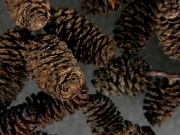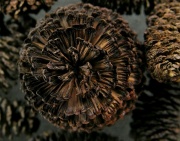Difference between revisions of "Conifer"
Jump to navigation
Jump to search
| (One intermediate revision by one other user not shown) | |||
| Line 10: | Line 10: | ||
shinyoju (Jap.); conifère (Fr.); conífera (Esp, It. Port.); evergreen | shinyoju (Jap.); conifère (Fr.); conífera (Esp, It. Port.); evergreen | ||
| − | == | + | ==Resources and Citations== |
* G.S.Brady, ''Materials Handbook'', McGraw-Hill Book Co., New York, 1971 | * G.S.Brady, ''Materials Handbook'', McGraw-Hill Book Co., New York, 1971 | ||
Latest revision as of 11:28, 4 July 2022
Description
One of two basic types of trees; the other is broad-leaves. Conifer trees, or evergreens, belong to the Coniferales group and are native to temperate climates of the northern hemisphere. Conifers have needle-like leaves and bear cones. Turpentine and resin are obtained from many conifer trees. The softwood trees are used for papermaking and construction. Examples of conifers are Pine, Larch, Fir, Yew, Sequoia, Redwood, Cypress, Juniper, cedar, and Spruce.
Synonyms and Related Terms
shinyoju (Jap.); conifère (Fr.); conífera (Esp, It. Port.); evergreen
Resources and Citations
- G.S.Brady, Materials Handbook, McGraw-Hill Book Co., New York, 1971
- Hermann Kuhn, Conservation and Restoration of Works of Art and Antiquities, Butterworths, London, 1986
- Walter C. McCrone, John Gustave Delly, The Particle Atlas, W. McCrone Associates, Chicago, IV, 1972
- Mary-Lou Florian, Dale Paul Kronkright, Ruth E. Norton, The Conservation of Artifacts Made from Plant Materials, The Getty Conservation Institute, Los Angeles, 1990
- Van Nostrand's Scientific Encyclopedia, Douglas M. Considine (ed.), Van Nostrand Reinhold, New York, 1976
- Random House, Webster's Encyclopedic Unabridged Dictionary of the English Language, Grammercy Book, New York, 1997
- Website address 1 Comment: Museum of the Japanese Traditional Arts at http://www.nihon-kogeikai.com/ (Jap. term)

